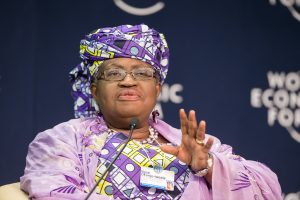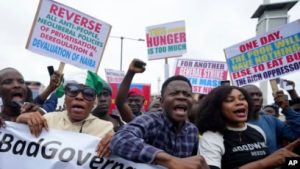Ngozi Okonjo-Iweala Urges Nigerian Politicians to End Treasury Looting
In a powerful address that resonates deeply within Nigeria’s political discourse, Dr. Ngozi Okonjo-Iweala, the former Finance Minister and current Director-General of the World Trade Organization, has issued a clarion call to Nigerian politicians to cease the rampant looting of the national treasury. Her remarks come at a time when the nation grapples with economic challenges exacerbated by corruption and mismanagement. Okonjo-Iweala’s passionate plea highlights the urgent need for accountability and integrity among public officials. She emphasizes that the future of Nigeria hinges on their willingness to prioritize the welfare of the citizenry over personal gain.

Corruption and Its Impact
Okonjo-Iweala, who has garnered international acclaim for her economic expertise and reform initiatives, expressed her dismay at the continued misappropriation of public funds. “The treasury is not a personal bank account,” she stated emphatically during a recent public forum. This statement reflects a growing frustration among citizens who have witnessed the diversion of resources meant for critical infrastructure, healthcare, and education into the pockets of corrupt officials. This sentiment resonates particularly in a country where millions live in poverty despite vast natural resources.
One striking example of this corruption is the infamous case of the missing $20 billion from the Nigerian National Petroleum Corporation (NNPC). This scandal sparked widespread outrage and demands for transparency. Despite numerous investigations, many of those implicated have evaded justice. Consequently, this has led to a pervasive culture of impunity. Okonjo-Iweala’s call to action seeks to dismantle this culture. She urges lawmakers to enact stringent measures that would hold corrupt officials accountable.
Creating an Environment of Accountability
“We must create an environment where corruption is not tolerated,” she urged. Therefore, she advocates for stronger legal frameworks and enforcement mechanisms. Her experience in implementing reforms during her tenure as Finance Minister provides her with a unique perspective on the challenges and opportunities that lie ahead. For instance, she recalled her efforts to publish monthly allocations to states. This empowered citizens to question their local governments about the use of funds. As a result, this initiative sparked a national conversation about accountability and transparency. It demonstrated the power of informed citizenry in combating corruption.

Moreover, Okonjo-Iweala emphasized the importance of civil society’s role in holding politicians accountable. She encouraged citizens to remain vigilant and to demand transparency from their leaders. “When the people speak up, change becomes inevitable,” she stated. This grassroots approach has the potential to shift the political landscape. In fact, it makes it increasingly difficult for corrupt practices to thrive. Citizens can make a difference by actively participating in the political process.
The Broader Implications of Corruption
In her address, Okonjo-Iweala also highlighted the broader implications of corruption on Nigeria’s development. She pointed out that the misallocation of resources hampers economic growth and undermines public trust in government institutions. “When citizens lose faith in their leaders, it creates a vicious cycle of disengagement and disillusionment,” she warned. This cycle, if left unchecked, could have dire consequences for Nigeria’s stability and progress.
As the nation prepares for upcoming elections, Okonjo-Iweala’s message serves as a timely reminder for politicians to prioritize the interests of the people they serve. She urged candidates to commit to ethical governance and to reject the allure of corruption. “The true measure of leadership is not how much wealth one accumulates, but how many lives one positively impacts,” she asserted. Thus, she calls for a new generation of leaders dedicated to the principles of integrity and service.

Conclusion: A Call for Change
In conclusion, Ngozi Okonjo-Iweala’s impassioned plea for Nigerian politicians to stop looting the treasury resonates with a populace yearning for change. Her call to action underscores the critical need for accountability, transparency, and ethical governance in Nigeria. As citizens rally behind this message, the hope for a brighter future rooted in integrity and service becomes increasingly attainable. The time for change is now, and it is imperative that both leaders and citizens work together to forge a path toward a more equitable and prosperous Nigeria.

